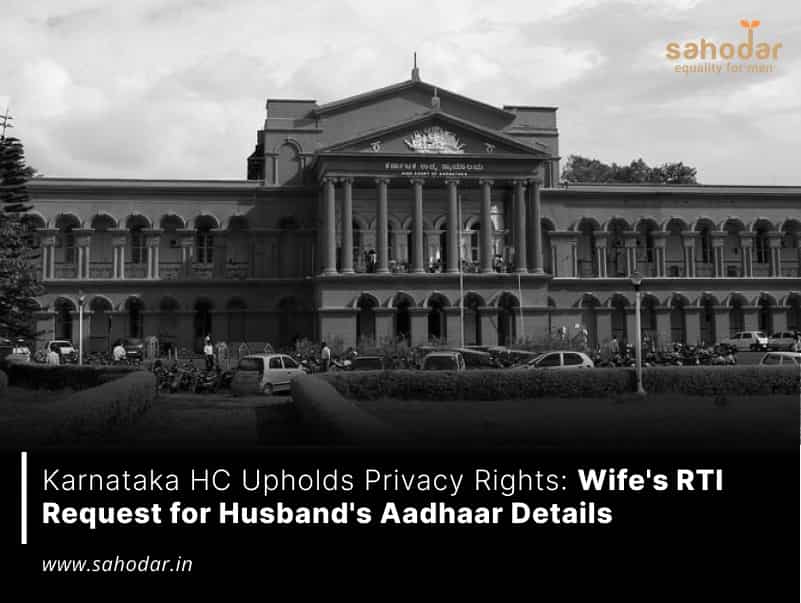The Karnataka High Court reversed the decision of a Single Judge Bench instructing the UIDAI to reconsider an RTI application filed by a wife seeking her husband’s Aadhaar Card details. The court underscored the preservation of an individual’s right to privacy even within the confines of marital relations, emphasizing that the procedural safeguards enshrined in Section 33 of the Aadhaar (Targeted Delivery of Financial and Other Subsidies, Benefits & Services) Act, 2016, protect the autonomy of such rights.
A Division Bench, comprising Justice S. Sunil Dutt Yadav and Justice Vijaykumar A. Patil, adjudicated a Writ Appeal initiated by the Assistant Director General, Central Public Information Officer, UIDAI. This appeal contested the Single Bench’s ruling that favored the wife’s petition and set aside the rejections issued by the appellants/Authorities. Consequently, the Single Bench directed a reconsideration of the wife’s RTI application pertaining to her husband’s Aadhaar information.
Context: The petitioner-wife, entangled in a matrimonial dispute, invoked Section 125 of the Cr.P.C. to secure maintenance from her husband. Despite the Family Court’s grant of relief, the enforcement of the order encountered challenges due to the husband’s evasion. In pursuit of locating him, the wife availed the provisions of the RTI Act, seeking specific details from her husband’s Aadhaar Card. Despite initial denials, the Single Judge mandated a hearing for the husband and a reevaluation of the wife’s application, leading to the present appeal.
The appellants contended that the Single Judge’s directive contravened Section 33 of the Aadhaar Act, emphasizing the mandatory requirement for a pre-disclosure hearing. Additionally, they stressed the imperative involvement of a High Court Judge in issuing such orders. The wife argued that RTI constraints are pertinent to third-party inquiries and asserted that within the context of marital relationships, the sharing of spousal information should not be subject to objection. She further maintained that the Single Judge’s ruling conformed to the statutory requirement of a hearing for the Aadhaar number holder, thereby mitigating any potential prejudice.
Considering the submissions, the High Court noted that by virtue of amendment to Section 33 of the Aadhaar Act changes have been brought in the following manner:- “i) Direction for divulging the information is to be made pursuant to the order of the Court, which is not inferior to that of a Judge of the High Court.”
The High Court relying on the afore-said provision accordingly ordered, “The requirement as contemplated under the proviso to Section 33(1) is an order for disclosure to be made by a Judge of the High Court. If that were to be so, learned Single Judge has grossly erred in directing the Assistant Director General, Central Public Information Officer (UIDAI) to issue notice to a person whose information sought to be divulged and to decide whether such information is to be divulged. Such power of passing an order to divulge the information is conferred on a Court not inferior to that of a Judge of the High Court in terms of Section 33(1) of the Aadhaar Act. It is a settled principle that, if the Act provides that particular act is to be made in a particular manner, it should be done in such manner or not at all.”
The Court further observed, “A person whose information is sought to be divulged has right to put-forth his case before such disclosure in terms of Section 33(1) of the Aadhaar Act. The right to privacy of Aadhaar number holder preserves the autonomy of the individual’s right to privacy which is conferred primacy and admits of no exception under the statutory scheme. The relationship by marriage which is a union of two partners does not eclipse the right to privacy which is the right of an individual and the autonomy of such individual’s right stands recognized and protected by the procedure of hearing contemplated under Section 33. The marriage by itself does not do away with the procedural right of hearing conferred under Section 33 of Aadhaar Act.”
The Court accordingly remitted the matter back to the Single Judge and stated that a person whose information is to be divulged is to be arrayed as respondent to the proceedings before the Single Judge. “Before concluding, it is necessary to observe that the rights conferred under Section 33 of Aadhaar Act requires order to be passed by a Court not inferior to that of a High Court Judge and to facilitate such right, the High Court is required to make appropriate provision in the applicable regime for such exercise of right which is a statutory right. With the above observations, Writ Appeal stands disposed off”, stated the Court in its Judgement.

